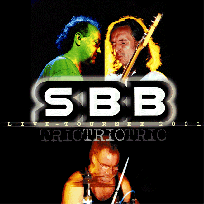Welcome to PaulWertico.com!
SBB:
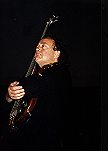
Józef
Skrzek |
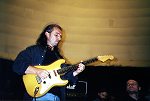
Apostolis
Anthimos |
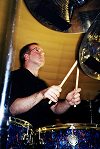
Paul Wertico |
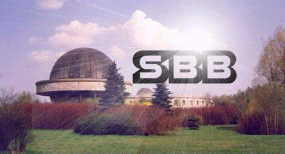

The History Of SBB:
New Gibraltar Encyclopedia of Progressive Rock writes:
SBB [Poland]
SBB 1 (74, aka Gruppa SBB), Nowy Horyzont (75), Pamiec (76), Ze Slowem Biegne do Ciebie (77), SBB (77, aka "Slovenian Girls"), Follow My Dream (78), SBB (78, West German, different from 1977 title), Welcome (78), Memento z Banalnym Tryptykiem (80), Live 1993 (93), Live in America (94)
SBB came into being in 1971 as Silesian Blues Band founded by Jozef Skrzek. (Skrzek was classicaly educated as a pianist but by the time of Silesian Blues Band he was a bassist renowned for his work with Breakout, the famous (in Poland, of course) Polish blues group.) The other members of the band were Jerzy Piotrowski (drums) and Apostolis Antymos (guitar). The trio made some radio recordings but it was very hard for them to break through into the Polish musical market. However, they were noticed by Czeslaw Niemen. (Nieman was sort of "king" of Polish rock. He became extremely famous in Poland in 60's, when he was performing pop and soul songs. In early 70's he turned to the experimental, progressive music balancing on the edge of rock and jazz. I can heartily recommend his 70's stuff. It is a truly progressive and original music). As a result, they joined him in the NIEMEN group, taking part in his artistic explorations and making music, which can be best described as 'impressionistic' and 'aleatoric' . Together they recorded Requiem dla Van Gogha (Requiem for Van Gogh) and Marionetki (Puppets), two records with truly unforgettable music. In 1974 they parted with Niemen and begin to play on their own.
They shortened the name of the band to SBB, which they explained as Szukaj, Burz, Buduj (Search, Break & Build). It was their musical credo: to search for the new possibilities in music, break the barriers and build the new music. They became very popular, mainly because of their concerts which were without any parallels in Polish rock of 70's. Suites with lots of improvisations incorporated hard jazz-rock Mahavishnu or Hendrix-like pieces as well as more soft classical ELP-like Skrzek's piano entries and masterful drumming from Piotrowski (which can be compared to that of Billy Cobham). They were surrounded by a cult of fans, became a symbol of young generation revolt (Apostolis had at that time probably the longest hair in Poland :-). Their first longplay (SBB 1) is a recording of a concert from April 1974 and is an impressive document of early live SBB. The second album, Nowy Horyzont (New Horizon), is a kind of musical manifesto, a sort of musical collage, combining bits of modern harmonies and Ravel with strongly rhythmic guitar and synth improvisations and naturalistic dissonance effects together with masterful piano cadenzas. "The music is everywhere," Skrzek was saying, "in Bach fugue, rock song or whistling. We like to play music, that's all. We don't care for borders and barriers, they are artificial. We want our music to be free, that's why we are never playing according to any program." Their third album, Pamiec (Remembrance) is much more stylistically clear than the first two. One may say that the logic and construction is joining the musical freedom here resulting in (in my opinion) the best SBB longplay. Skrzek's dreamy vocals are at their best. (The lyrics are writtem by the poet Julian Matej - full of metaphores and mystery). The fourth album, Ze slowem biegne do ciebie (I am coming to you with a word]), is quite different from the previous album. It is more symphonic-rock like and 'spacy' (one may think about Gong as a parallel) with lots of synths (although Apostolis guitar is still here and well). There are only two pieces on this LP, each one about 20 minutes and a good example of music played by SBB at this time. During concerts they created a sort of a 'continous form,' music with no ending or beginning, full of fragmentary impressions, different paraphrases and frisks with sound. In 1976-79 SBB was trying to conquer foreign audiences. They played in Austria, West Berlin, Czechoslovakia, Denmark, Finland, West and East Germany and Hungary. They recorded 4 LPs abroad, two in West Germany, one in East Germany and one in Czechoslovakia. The two released in West Germany were Follow My Dream and Welcome. The music presented here is much more compact and clearly SBB is trying to make their compositions more accesible for the listener. They are producing shorter forms (songs than suites), the music is a bit more commercial and poppier. Lyrics are in English and are not written by Julian Matej any longer (which is a shame, as far as I'm concerned). Nevertheless their music remains to be very unique and its still full of new musical ideas and innovations.
Despite all these efforts, SBB failed to conquer western markets; after all the disco and punk era in West was beginning. So, for Memento z Banalnym Tryptykiem (Memento with a banal tryptych), there was no more the desire to attract Western listeners. Julian Matej is back again with his mystical lyrics and Skrzek returned to the ideas from before Welcome. The record sounds in a way like a continuation of Pamiec, although some new elements are here, as well as an additional guitarist, Slawomir Piwowar (who played before with the jazz group Paradox as well as with Czeslaw Niemen). This album could well be a good beginning of a new phase in SBB history, but it turned out to be their last album before the breakup in 1981. Since then, Skrzek continued to compose and perform. It is impossible not to mention here the album Ojciec Chrzestny Dominika (Dominic's Godfather) - his absolute opus magnum. Skrzek is playing over 30 instruments here as well as singing (Matej's lyrics, of course) and, in my opinion, it is one of the best Polish LPs ever recorded. His other works include, among others, music for Piotr Szulkin's film "Wojna Swiatow" (The War of the Worlds), the heaviest album that he ever recorded; Jozefina [Josephine], with English lyrics and original SBB lineup; and Pamietnik Karoliny (Caroline's Diary). He has never stopped performing and I will always remember his light-and-sound shows at Silesian Planetarium. The other SBB ex-members were very active too. Piotrowski became the most wanted drummer on Polish musical market and played with several groups, Apostolis turned to jazz and in mid 80's moved to NYC, where he worked as a session musician, recording with many jazz and rock bands including Pat Metheny as well as composing his own music.
It didn't seem very probable that they will ever play together again so it came as a great surprise when it was annouced that they will give a charity concert in 1993. It was a great show (documented by the album Live 1993) and after it they decided they would try to reactivate SBB. "We told each other that we have to play, because there is still some potential inside us. And, besides, we simply like each other," Skrzek said in an interview. The new SBB lineup features, apart from Skrzek, Piotrowski and Apostolis, Hryniewicz (vocal and acoustic guitar) and Rusek (bass). In this new incarnation Hryniewicz became a kind of new frontman and Skrzek is singing less, concentrating on his keyboards. They gave several concerts in Poland, which were in a good old SBB style featuring mainly the old material with some new pieces and, of course, lenghty improvisations. This year they went to USA, where they toured and recorded an album Live in America. -- Piotr Szymczak
Crohinga Well writes:
One band that always tried to break all the rules in Polish rock music was SBB. It was founded by Jozef Skrzek, a bass, harmonica, violin and keyboard player who started his musical training when he was four years old. As he wanted to become a concert pianist he enrolled in Poland's most prestigious music school (situated in Kattowice) in 1967. After having broken his hand (while playing an etude) he wasn't able to practice for about half a year, and in 1969 he gave up his plans to become a classical pianist and started playing in various rock and jazz bands.
In 1970 he joined Breakout as their bass player. Funnily enough, the reason for his departure from this band didn't have anything to do with music: one night when the band were watching a football game on television after a gig drummer Jozef Hajdasz starting making fun of Skrzek's favourite team, thus causing a violent emotional outburst (hell hath no greater fury than a football supporter scorned, so to speak) at the end of which Skrzek just took his bass guitar, went away and never came back.
A year later, he teamed up with drummer Jerzy Piotrowski and Greek immigrant guitarist Apostolis Antymos. When the three started playing together in 1971 their financial situation was none too good; they rehearsed in a damp cellar (all good rock bands rehearse in damp cellars; our own rehearsal room has had regular lakes in it, L.), didn't have any equipment of their own and almost no hope of ever earning enough money to be able to buy any.
As The Silesian Blues Band they played at various places in Poland's countryside with a repertoire consisting of rock, blues and swing. In 1972 they had the good fortune to be noticed by Poland's rock idol number one, Czeslaw Niemen, who hired them as his backing band.
As this is the second time he crosses our path, a little explanatory parenthesis seems in order: Niemen was born on February 16th, 1939 in Wasiliszki, Byelorussia, as Czeslaw Wydrzycki (let's face it, the name "Niemen" has a lot more commercial potential). His father was a piano tuner, so he was able to start teaching his son music from a very early age. As a child, Czeslaw sang in a Gregorian church choir and during his high school days he was in a band that only played songs that came from the Slavic folk heritage. He studied for four years in Grodno (a town that lies in Byelorussia, very near the Polish border) where he learned to play Russian instruments like the domra and the baian. His jazz and pop career started in 1958 (two of his main influences being Bill Haley and Elvis Presley). In 1962 he won the first prize in the "First Festival of Young Talent", after which he toured in western Europe with a pop band called The Blue Blacks, and visited France, Sweden, Hungary and Yugoslavia. In later years he was to amass more trophies, like the Midem-award and a special award by Billboard magazine, as well as being crowned musician of the year. Early albums include "Dziwny Jest Ten Swiat", "Czy Mnie Jeszcze Pamietasz" and especially "Enigmatic", a record that tends towards the psychedelic.
On "Vol. I" and "Vol. II", released in 1972, Niemen can be heard with backing by the three SBB musicians, but the end result is not wholly convincing (mainly due to the "chanson" way of singing), although the records in themselves are far from bad and contain some pretty weird noises. The SBB boys also felt the more commercial approach of Niemen cramped their style a bit and found it hard to live with the fact that they were being reduced to the status of backing musicians only, so the collaboration only lasted for about a year.
Niemen went on to record lots of other albums (one of the best of which -in my opinion- is the double effort credited to Niemen Aerolit and titled "Idee Fixe") and working with well-known musicians from the west, like John Abercrombie, Jan Hammer and Steve Khan as his music gradually became more jazzrock-oriented. Skrzek, Piotroswki and Antymos -now calling themselves Szukaj, Burz I Buduj ("Search, Breakup And Build") - started out on their own once again, making their debut on February 4th, 1974 and re-cording a first album in the same year; it was simply called "SBB" and was recorded live in the Stodola Club in Warsaw. There are only two tracks on it ("Odlot" and "Wizje") both full of fuzz and bass guitar duels (Skrzek must rank among the world's great rock bassists, using his bass guitar as a solo instrument) not entirely dissimilar to the sound of Clear Blue Sky or Blonde On Blonde. Generally, their music is very "underground" and at times sounds like a cross between Mahavishnu Orchestra and early Pink Floyd or even Group 1850.
"SBB" became another instant collector's item, since the sales figures were very satisfying indeed from the very beginning, so it wasn't long before the entire supply was sold out, with the record fetching very high prices on the omnipresent black market. Their second effort, "Nowy Horizont", was in the same vein, although side one now consisted of several shorter tracks all mixed into one another (recorded in a rather curious fashion, with the drums mixed to the foreground in a fairly unusual manner, I might add, L.). 1975 also saw them issuing their third, "Pamiec", and by the time "Ze Slowem Biegne Do Ciebie" came out in 1976 SBB had become a household name throughout what used to be called the eastern bloc, having been asked for radio and tv shows in various countries. By this time, their music still had its psychedelic tinges, but had evolved towards a more symphonic sound.
After having been voted the most popular Polish rock band by the readers of an influential music magazine and recording an album in Czechoslovakia, SBB started to broaden its horizon by 1977, touring in Belgium, Austria, Holland, Denmark, Switzerland and Germany. In November 1977 they recorded their first "western" album at the Ton-cooperative in Hannover. It was released on Spiegelei in 1978 (Marc Mushroom still has a poster that adorned Antwerp walls at the time, to promote their concert in a small venue on the outskirts of town, L.) and was called "Follow My Dream".
The same year saw them appearing on German television twice, as well as winning the "Gouden Zeezwaluw" ("Golden Sea Swallow") award in Knokke (Belgium). Their second "western" release was called "Welcome" and had been recorded in September 1978 in the Polish Radio & TV Studio at Opole; the remixing was done in Conny Plank's studio in October. By the time "Slovenian Girls" was issued (in 1979; it was actually a sort of a remake of "Odejscie", their Czechoslovakian album) the music had shifted completely from the psychedelic towards progressive symphonic jazzrock (if there is such a thing) but SBB didn't make it into the eighties: they split up just before the turn of the decade. Jozef Skrzek went on to make a number of (mostly electronic) solo albums in the eighties. -- Wojtek Hankiewicz
SBB Today:
Today, SBB is an again an important existing band. Their live CD "Good bye!" (released in 2000) was followed by their latest 2001 studio CD entitled "The Golden Harp". Both CD's were recorded with new drummer Paul Wertico from Chicago. The trio of Antymos, Wertico and Skrzek have been actively touring around Europe in Germany, The Czech Republic, Poland and Hungary, playing to enthusiastic audiences and sold out shows. SBB was recently inducted into the Polish Rock 'N' Roll Hall of Fame and voted the #1 Polish rock band of all time!
Recordings:
Nastroje
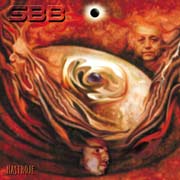 Released in 2002 on EMI/Pomato, SBB's latest CD entitled "Nastroje"
Released in 2002 on EMI/Pomato, SBB's latest CD entitled "Nastroje"
Goodbye!

Tracks:
- Born To Die (SBB) 8:43
- Wish (Jozef Skrzek) 9:02
- Drumbottle (Antymos Apostolis / Paul Wertico) 4:40
- Boogie (Jozef Skrzek) 10:18
- Rainbowman (Jozef Skrzek) 9:38
- Odlot (Jozef Skrzek / Jacek Gran) 9:34
- Paul (Paul Wertico) 3:32
2000 Live CD
- Jozef Skrzek - keyboards, piano, bass guitar, vocals
- Paul Wertico - drums
- Apostolis Anthymos - guitar, drums
Recorded 29 April 2000 live at Vereinshaus in Herzogenaurach, Germany.
Additional recording 12-15 June 2000 at Studio Pink Noise, Aachen
The Golden Harp
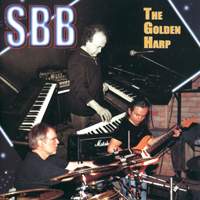
Tracks:
- The Golden Harp (Jozef Skrzek, Heike Aretz) 5:50
- Bar Wah Wah (Apostolis Anthymos) 4:20
- Least It's Sunny (Paul Wertico) 4:43
- Strawbury Jam (SBB) 2:56
- The Golden Harp (Instrumental) (Jozef Skrzek) 5:56
2001 Promo CD
- Jozef Skrzek - vocals, bass guitar, piano, keyboards, harp
- Paul Wertico - drums
- Apostolis Anthymos - guitars, percussion
Recorded 3-5 April 2001 at Studio "Propast" in Czech Republic
- Sound Engineer: Petr Ackermann
- Production: Slavek Jisa
|
The Golden HarpMusic: Josef Skrzek |
She's really grooving with the sun and stars
While playing on her golden harp
The way her fingers pull the strings
Let you forget the daily things
The way she plays I can say it goes straight to my heart
She's an ambassadress from heaven playing on a golden harp
I know I love her nothing left to say
Waiting in her arms for the bring of day
Wordless, muted that's her way
Only in silence you can hear her play
Like an angel she blows into her golden horn
Not staying on earth but she's not gone
And if she likes to give me a sign
She's playing a melody so sweet and fine
The way she plays, I can say, it goes straight to my heart
She's an ambassadress from heaven playing on a golden harp
I know I love her nothing left to say
Waiting in her arms for the bring of day
Wordless, muted that's her way
Only in silence you can hear her play
I would never talk while listening to her play
Maybe otherwise she wouldn't stay
And when she is finished she gimme a smile
Oh I can feel the joy for a long long while
The way she plays, I can say, it goes straight to my heart
She's an ambassadress from heaven playing on a golden harp
I know I love her nothing left to say
Waiting in her arms for the bring of day
Wordless, muted that's her way
Only in silence you can hear her play
|
Least It's SunnyMusic & Lyrics: Paul Wertico |
It ain't funny
Need some money
Lost my honey
Least it's sunny
|
SBB's CD entitled "TRIO Live Tournee 2001" on Silesia Records
